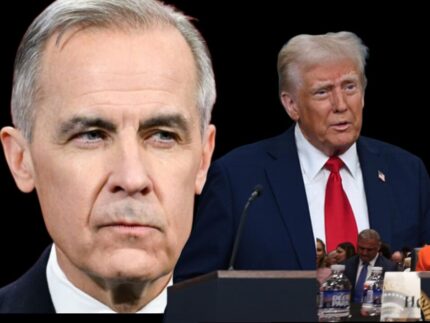U.S. President Donald Trump and Canadian Prime Minister Mark Carney spoke for the first time since Carney took office, describing the conversation as “extremely productive” and “constructive” despite escalating trade tensions. The Friday morning call, initiated by the White House, comes amid a looming trade war that threatens to disrupt economic relations between the two neighboring countries.
Trump, who has previously suggested that Canada should become the 51st U.S. state, adopted a more conciliatory tone, stating, “I’ve always loved Canada. We had a very good conversation, and we agree on many things.” Carney, in turn, acknowledged that while the discussion was constructive, Canada remains firm in protecting its sovereignty and economic interests.
The two leaders agreed to begin comprehensive negotiations about a new economic and security relationship following Canada’s upcoming general election on April 28. However, with tensions high over new U.S. tariffs on Canadian goods, the road to resolution remains uncertain.
U.S. Tariffs Threaten Canadian Auto Industry
A major point of contention between the two leaders is Trump’s planned 25% tariff on vehicle imports, set to take effect on April 2. The tariff could have devastating consequences for Canada’s auto industry, which employs over 500,000 people and exports more than one million cars annually to the United States.
The Canadian government has already retaliated against previous U.S. tariffs with C$60 billion ($42 billion) in duties on American goods. However, Carney has warned that if the new vehicle tariffs proceed, additional retaliatory measures with “maximum impact” on the U.S. economy will follow.
“The United States is no longer a reliable trading partner,” Carney said earlier this week. “We must look beyond our southern neighbor and forge new economic alliances.”
Political Ramifications in Canada’s Upcoming Election
The deteriorating U.S.-Canada relationship has become a central issue in Canada’s election campaign. Carney, leader of the Liberal Party, faces increasing scrutiny over how he will handle the escalating trade war.
Pierre Poilievre, leader of the opposition Conservative Party, accused Carney of being too accommodating to Trump, stating, “The Liberals have been in power since 2015, and they have allowed Trump to take our money and our jobs. It’s time for a government that will fight back.”
Meanwhile, Bloc Québécois leader Yves-François Blanchet expressed concerns that Carney’s willingness to engage in “comprehensive negotiations” with Trump might signal a willingness to concede to U.S. demands. Left-wing New Democratic Party (NDP) leader Jagmeet Singh called the tariffs a “betrayal” and emphasized the need for a more aggressive response to U.S. economic aggression.
Trump’s Warning Against Canada-EU Trade Alliances
As Canada explores trade alternatives, Trump has issued stark warnings against any efforts to collaborate with the European Union or other international partners to counter U.S. tariffs. He threatened that any such action would be met with “large-scale tariffs, far larger than currently planned.”
Despite the warnings, Carney has indicated a willingness to reduce Canada’s economic dependence on the U.S. and strengthen ties with the European Union and Asia. “We need to pivot our trade relationships elsewhere,” Carney told reporters in Ottawa. “This is a wake-up call for Canada to diversify its markets.”
Uncertain Future for US-Canada Relations
While Trump and Carney’s conversation marked a diplomatic step forward, the broader trade dispute remains unresolved. Trump’s tariff policies continue to strain the historically strong alliance between the two nations, and further retaliatory measures could deepen the economic rift.
With Canada’s general election approaching, the outcome could shape the future of US-Canada relations. Carney has promised to negotiate a fair deal for Canada if re-elected, while opposition leaders argue for a tougher stance against U.S. economic pressure. As the April 2 deadline for the auto tariffs looms, the world watches to see whether diplomacy or further confrontation will define the next chapter of this trade conflict.














